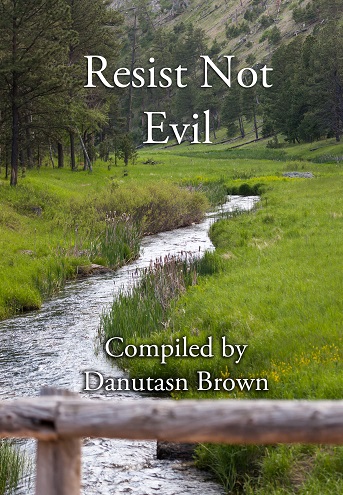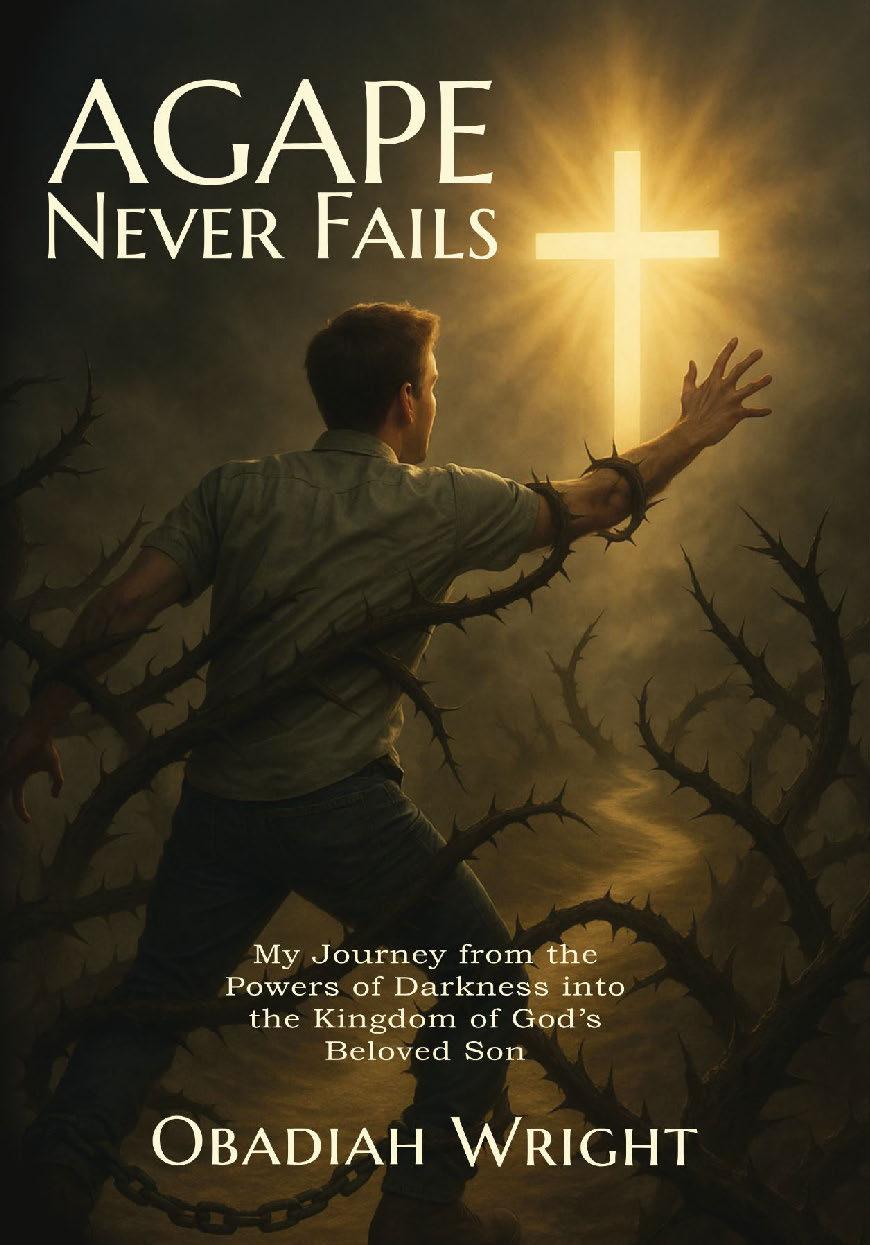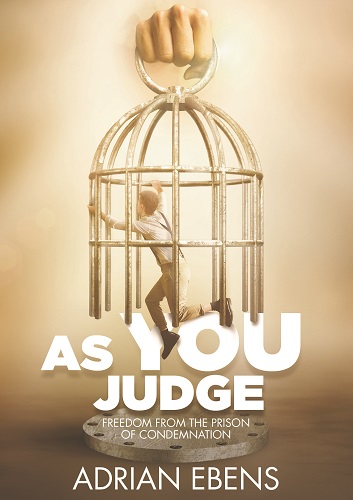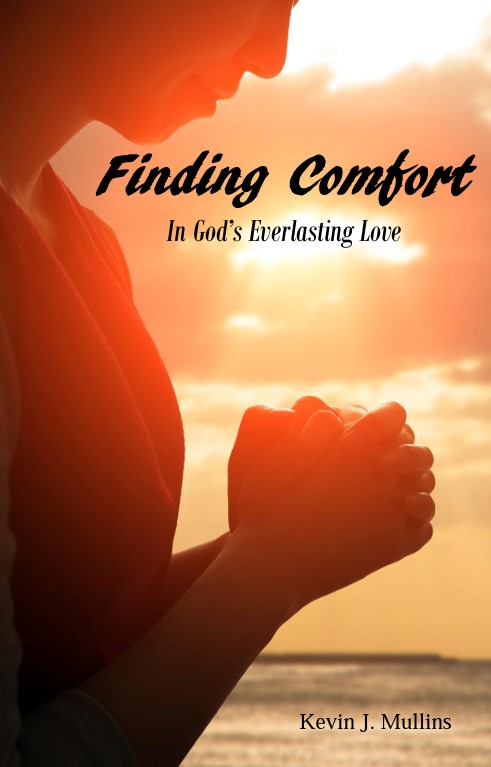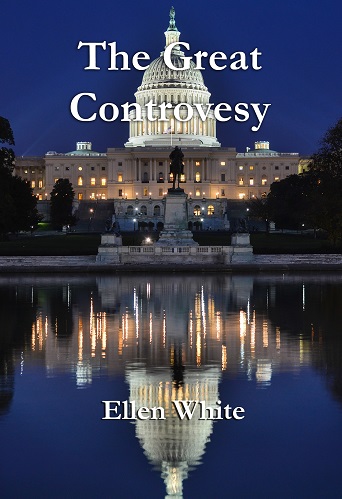What about using injurious force to protect others?
This question was asked, and it is echoed by many:
What about self defense or protecting your wife or daughter from a rapist. I agree with you about war, murder, degrading our fellow humans. But I wouldn't stand there quoting Bible verses while someone is raping my wife or breaking into my house.
But I say unto you, That ye resist not evil: but whosoever shall smite thee on thy right cheek, turn to him the other also. (Matthew 5:39)But I say unto you, Love your enemies, bless them that curse you, do good to them that hate you... (Matthew 5:44)
Q. Is the term Non-resistance to be taken in its most absolute sense, as implying no resistance of evil?
A. No. It must be understood in the precise sense of our Savior's injunction, "Resist not evil"; i.e. resist not injury with injury. Evil must be resisted by every and all righteous means, but never with evil.
Q. How does it appear that Christ meant to be understood -- resist not injury with injury?
A. From the context. He says -- "Ye have heard that it hath been said, An eye for an eye, and a tooth for a tooth; but I say unto you that ye resist not evil: but whosoever shall smite thee on thy right cheek, turn to him the other also. And if any man will sue thee at the law, and take away thy coat, let him have thy cloak also."
Adin Ballou's 'Non-Resistant Catechism', 1844 (http://www.adinballou.org/catechism.shtml)
Notice that the passage in question, to not resist evil, is understood to mean not to resist evil by inflicting injury on the other person. Is that the correct way for it to be understood? I think so. Can we love our enemy and kill him for attacking us, when we are definitevely told not to smite back? What about protecting others by not killin them, like just beating them or striking them? Are we saying that we should not protect a child who is being beaten?
"Say not thou, 'I will recompense evil'; but wait on the LORD, and He shall save thee." (Proverbs 20:22)
So how then does Adin Ballou answer the question of extreme cases? He lived in a much more violent time, when people had much more need to carry arms to defend himself, and thus his experiene on this shows and he relates his powerful answer. This is from his 'Christian Non-Resistance in Extreme Cases', 1860:
AN EXTREME CASE MET
Let us meet these extreme cases which are alleged to be so fatal to Christian non-resistance. Let us see if they are more extreme, or more numerous, than the war-principle involves. Here is one: "Suppose a robber attacks you in some lonely place on the highway; your money and your life are in jeopardy; as a Christian non-resistant what will you do?"
Let me consider first what I should do as a resistant. If unarmed, as most persons are apt to be in such emergencies, I should probably be frightened and submit to all exactions, however much I believed in fighting. Fighting men without arms generally yield readily to an enemy with deadly weapons in his hands. They are very much afraid of being killed. But I might be armed; what then? Two chances to one I should even then be so disconcerted as to be at the mercy of my assailant, and thus be slain, or badly disabled. If not, two chances to one his weapons, coolly poised, would take effect, while mine missed their mark. Then where should I be? It is not to be assumed, in such cases, that the party in the right always masters his foe. A cool, expert ruffian has generally a decided advantage. In most cases he carries his point. But suppose in one case out of five, I save my life and purse by killing the robber; what then? I have prolonged my life a little on earth and saved my money. I have also precipitated him, with all his sins on his head, into the world of spirits, utterly regardless of his good here or there.
I have taken care of my own mortal self. I am proud of my exploit, or rather of my luck. Will it make me a better man? Probably not. Probably it will make me a vainer, harder hearted man, more ready to glorify and trust in deadly weapons. Will it make others better? Probably it will stimulate them to arm themselves for a like exploit, and give a greater or less impetus to the fighting spirit. And this will make every man worse that imbibes it - more disposed to boast, threaten, defy and quarrel. What will be its moral effect on unprincipled rascals? It will inspire a few with temporary dread, others with cunning caution, others with an ambition to handle deadly weapons more expertly than their unlucky comrade, but not one with repentance, redeeming emotions, or really better feelings - not one.
What Is To Be Done
I will now consider what I am to do, in such a case, as a Christian non-resistant. If I am true one, 1 shall not be half so likely to be attacked by a robber, as if a fighting man. My habitual humility, humanity, kindness and forbearance will be a preventive in the minds of many who might otherwise he bad enough to rob me. They would say, "I cannot rob him; he never treats the meanest with contempt; he would put his hand in his pocket at any moment to relieve me in distress; I cannot touch him; he will never harm me; I must take some proud, stingy, crabbed or dashing fellow for my victim." This would be the feeling of more than half the bad characters that knew me.
But, say you, what of the rest? Some one of them attacks me. If I am a true Christian non-resistant, I am no coward. I am calm, kind, firm and brave. He presents his pistol and says, "Your money or your life."
I reply, "Unfortunate brother, do you know that I am your friend? Would you shed my blood? I am not afraid of death. My hope and my home are in heaven. Are you unfortunate, needy, distressed, friendless? then I will loan you, or give you, what I am able. Do not sin by robbing one who is willing to befriend you, and who will never harm you!"
The chances are ten to one that such language, with such kindness, calmness, and fearlessness, would impel the robber to fly from me at once, or would melt him down, or would lead him to say, "I am in want; loan me a little; or give me something of your own accord; I will not harm you." In either of these cases I should escape in safety, and he would leave me with a holy lesson never to be forgotten - a lesson which could by no possibility make him a worse man, if it did not make him a better. Under such treatment steadily pursued by the generality of honest people, robbing would soon become a rare crime.
"But," say you, "what if the villain should chance to be utterly unsusceptible to your appeal, and recklessly shoot you in the midst of your very friendly talk?" That is not at all likely; yet if he should, my case would still be a more desirable one than the cases of four fifths of resistants; for they are killed in the act of trying to kill their assailants, and are wholly unprepared in spirit for their change; whereas I should only go to a better sphere a little sooner than in the natural way, and should have left an arrow of moral conviction in the bosom of my murderer which would never cease to wound him for his good till he became a reformed spirit. My conduct would be unselfish, noble, brave and salutary in all its influences. I should lose my life on earth for the sake of a divine principle, and so spiritually keep it unto life eternal. Would you have me set at nought all such heavenly considerations, and either die, or live a little longer, by a murderous squabble with a. wretched fellow creature? Do you not see that in the average I should be ten times safer on my ground than on the other? And do you not see that, living or dying, I should do ten times more to put an end to all such violence in the world, than I could as an armed fighting man?
ACTUAL ILLUSTRATIONS
That you may see that my illustrations are not merely imaginary, permit me to give you two or three actual, well authenticated cases of the kind.
The Young Man near Philadelphia
A few years since, a young man in the vicinity of Philadelphia was one evening stopped in a grove, with the demand, "Your money, or your life." The robber then presented a pistol to his breast. The young man, having a large sum of money, proceeded leisurely and calmly to hand it over to his enemy, at the same time setting before him the wickedness and peril of his career. The rebukes of the young man cut the robber to the heart. He became enraged, cocked his pistol, held it to the young man's head, and with an oath, said, "Stop that preaching, or I will blow out your brains." The young man calmly replied, "Friend, to save my money, I would not risk my life; but to save you from your evil course, I am willing to die. I shall not cease to plead with you." He then poured in the truth still more earnestly and kindly. Soon the pistol fell to the ground; the tears began to flow; and the robber was overcome. He handed the money all back with the remark, "I cannot rob a man of such principles."
Robert Barclay and Leonard Fell
Robert Barclay, the celebrated apologist of the Quakers, and Leonard Fell, a member of the same Society, were severally attacked by highwaymen in England, at different times. Both faithfully adhered to their non-resistance principles, and both signally triumphed. The pistol was leveled at Barclay, and a determined demand made for his purse. Calm and self-possessed, he looked the robber in the face, with a firm but meek benignity, assured him he was his and every man's friend, that he was willing and ready to relieve his wants, that he was free from the fear of death through a divine hope in immortality, and therefore was not to be intimidated by a deadly weapon; and then appealed to him, whether he could have a heart to shed the blood of one who had no other feeling or purpose but to do him good. The robber was confounded; his eye melted; his brawny arm trembled; his pistol fell to his side; and he fled from the presence of the non-resistant hero whom he could no longer confront.
Fell was assaulted in a much more violent manner. The robber rushed upon him, dragged him from his horse, rifled his pockets, and threatened to blow out his brains on the spot, if he made the least resistance. This was the work of a moment. But Fell experienced no panic. His principles raised him above the fear of man and of death. Though forbidden to speak, he calmly but resolutely reproved the robber for his wickedness, warned him of the consequences of such a course of life, counseled him to reform, and assured him that while he forgave this wanton outrage on himself, he hoped for his own sake he would henceforth betake himself to an upright calling. His expostulation was so fearless, faithful and affectionate, that the robber was struck with compunction, delivered back his money and horse, and bade him go in peace. Then, with tears filling his eyes, he exclaimed, "May God have mercy on a sinful wretch," and hastened out of sight.
So much for one of your extreme cases. Now for another.
ANOTHER EXTREME CASE MET
"Suppose you and your family should be attacked by a gang of vile scoundrels, who should design to commit rape, robbery and murder, or perhaps to kidnap yourself, wife and children for sale into interminable slavery; what would you do in that case?"
That would indeed be a horribly extreme case. Do you think I should be more liable to such a terrible trial as a Christian non-resistant, than as a common resistant? I see no reason why I should. I see several reasons why I should be less exposed. But I might come even into such straits. Possibly God and his good angels might leave me and my family to such a trial. If so, I would hope to pass through it, with heavenly help, worthily. I might fall from my principles, and be driven to distraction. But I should pray that it might be otherwise.
As a fighting man my only chance would be to kill outright, foil or frighten off this gang of scoundrels; in which case I should do nothing, nor even design to do anything, for their good in this world or the next. But if I were not a match for them at this game of deadly violence, what then? Of course, they would either kill or disable me, and then without compunction proceed to accomplish their hellish purposes on my family. In war, rape and booty have ten thousand times been the watchwords of the victors. Ten thousand times husbands, fathers and brothers have been compelled to witness the ferocious defilement of their screaming loved ones, and then been hewn in pieces themselves with a broad sword, or pierced through with a bayonet. This is one of the infernal accompaniments of victorious war. and the war principle is heavily chargeable with such atrocious crimes. Say then how many chances, as a fighting man, I should have to save myself or my family from this supposed gang of scoundrels? You perceive at once that fighting would in many cases only make the matter worse. The odds must be in my favor, or resistance would be vain.
What Defense Might Be Made
Let me now imagine how much of a defense I might make as a Christian non-resistant. Suppose my spirit to be benignant, calm, meek, firm and heroic. How are these wicked men to introduce their business? They see me and my family quietly in our habitation unarmed. They rudely knock at our door, or thrust themselves in without leave. But I meet them with a friendly look, resolutely kind, and inquire, "What brings you thus into our peaceful abode? We desire to be the friends of mankind, the enemies of none. In what way can we do you good? Are you hungry, needy, suffering? What do you wish?" They must quickly commence their outrage, or be embarrassed, nonplussed and disposed to make a retreat. It is hard to fight this sort of battles with a true peace man - much harder than many suppose. I should stand more than an even chance to outgeneral such assailants.
But worst might come to worst, and what then? I should remonstrate with all my moral energy. "You have come to commit murder and rapine on a peaceful family who never did you any injury! Will you be guilty of such crimes! We cannot do you intentional harm, but we shall resist you by all the non-injurious force in our power. Understand me; you cannot murder or dishonor these, my beloved ones, till you shall have crushed out my own physical strength and theirs." In such an extreme I should place myself in front of my wife and children, and cover their retreat to the best of my ability, shielding them from outrage with my body, and exerting all the uninjurious force I possessed to protect them. I might be killed at once, or disabled, or overcome at length, and then the worst designs of our assailants would be consummated. But I should have been true to my principles, and done my duty. Then dead or alive, my family dead or alive, be the consequences what they might to my or their mortal existence, my and their spiritual existence would take on eternal life. Moreover, I should have set an example and exerted an influence every atom of which would tend to put away from the human race this hellish spirit of violence which caused my extreme case of trial.
Remember that this gang of scoundrels were born, bred and trained for their wickedness by the war-spirit in a pro-war state of society. They are pupils of the war-school. They could never have been bred to such crimes in a state of society formed by the principles and tuition of Christian non-resistance. Therefore, whoever acts in accordance with this doctrine does just so much towards putting an end to all these supposed extreme cases. And whoever favors the war-principle and system does just so much towards breeding up more or less of just such wretches, and perpetuating the possibility of just such cases.
WHO ARE ON THE SAFEST SIDE
Thus I have supposed and granted much that might be imagined to happen in extreme cases. But every reflecting mind must see that all the trials and miseries which could befall faithful Christian non-resistants in such cases would be nothing in comparison with those which necessarily befall fighting men and their families in every considerable war that takes place the world over.
What then would people lose in these respects by becoming true disciples of this doctrine? They would gain much. Besides, these supposed extreme cases very seldom happen. Christian non-resistants would run more risk of being struck with lightning than of being overtaken by such trials. If we could find fifty Christian non-resistants and count them out against fifty average resistants, the fifty non-resistants, all other things being equal, would live out more years on earth, and suffer less from the aggressions of bad men, than the fifty resistants. There might be extreme cases with both classes, but I confidently affirm that the non-resistants, if true, faithful and consistent, would enjoy decidedly the most of all real good on earth, to say nothing of their superior condition in the spheres beyond.
It would be so with larger numbers, with communities, and with nations, acting on the same principles. For example, I refer you to the early history of Pennsylvania, which records the glorious fact that William Penn's colony of Quakers lived unarmed in the midst of warlike savages for seventy years unharmed, and even befriended in their utmost need. Also, to the wonderful preservation of the Quakers and Moravians during the two great Irish rebellions - not one faithful adherent to the peace principle having lost his life, though many were fearfully imperiled. Also, to alike preservation of the Quakers through the devastating Indian wars on our Western frontiers during the last century.
And so it ought to be, if the doctrine is divine. God has undoubtedly shown us, in this peculiar doctrine of his Son, the most excellent way of promoting human welfare both for this life and the future. It is only the extreme cases that are plausibly urged against this doctrine. And these are unreasonably urged; because the whole history of mankind demonstrates that the extreme cases on the opposite side are ten times more numerous. So that if a man is to be frightened from Christian non-resistance by a few extreme cases of trial and suffering, he ought to be frightened ten times worse by the terrors on the other side.
Christian Non-Resistance in Extreme Cases, 1860 - http://www.adinballou.org/extreme.shtml
For more testimonies on this subject, please see this booklet:
https://maranathamedia.com/book/view/resist-not-evil
